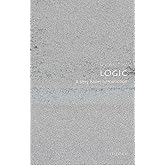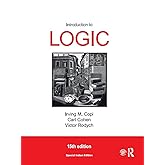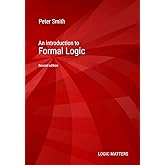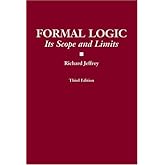
Download the free Kindle app and start reading Kindle books instantly on your smartphone, tablet or computer—no Kindle device required.
Read instantly on your browser with Kindle for Web.
Using your mobile phone camera, scan the code below and download the Kindle app.

Follow the author
OK
Logic: The Laws of Truth Hardcover – 12 June 2012
You can select and apply an appropriate plan based on your cart value at checkout.
-
3-12 mo instalmentsLatitude
-
Pay at Your PaceZip
| Payment options | Interest | Total* |
|---|---|---|
| $22.69/mo (3 mo) minimum purchase of $50 | 0% | $68.04 |
** Latitude: Monthly credit card fee (currently $10.95) will apply. Equal monthly repayments apply, account fees, late fees apply. Provider may charge interest. Exclusions apply. For more details click on Learn more above. You acknowledge that credit is provided to you by Latitude Finance Australia ABN 42 008 583 588, Australian Credit Licence number 392145, and the instalment plan is subject to the terms and conditions imposed on you by Latitude. Equal monthly repayments apply (exact amounts specified in your Latitude statement) and card fees will be charged by Latitude. If you fail to make your minimum monthly payment for two consecutive months, you agree that your equal monthly payment plans (Instalment Interest Free Promotion) with a term of fewer than 33 months will change into a minimum monthly payment plan (Interest Free Promotion) for the remaining duration of the initial plan term. If you fail to make a payment on time, Latitude will charge late fees. Latitude will also charge interest on any outstanding balance at the end of the instalment plan period you select at the rate set out in its T&Cs (currently 29.99% p.a.). Interest may also apply to other Latitude credit card transactions or if you do not comply with the Latitude T&Cs.
| Account type | Interest |
|---|---|
| Zip Pay | Always interest free^ |
| Zip Money | 12 mo interest free,
25.9% p.a. thereafter* |
^Zip Pay: This is a credit product and is interest free. Minimum monthly repayments are required. A monthly account fee of $9.95 is charged by Zip and is subject to change. Pay your closing balance in full by the due date each month and Zip will waive the fee. Available to approved applicants only and subject to completion of satisfactory credit assessment by Zip. Other charges may be payable. Fees and charges subject to change. Zip T&Cs apply. T&Cs available on application. See your Zip contract for further details. Credit provided by Zip Money Payments Pty Ltd (ABN 58 164 440 993), Australian Credit Licence Number 441878.
*Zip Money: Interest free term subject to minimum spend and promotional partner offer. Available to approved applicants only and subject to completion of satisfactory credit check. The repayment advertised will repay the transaction balance within the advertised interest free period. A monthly account fee of $9.95 applies and a one off establishment fee may apply for new customers. Under the contract, minimum monthly repayments are required and will vary depending on your credit limit. Instalment plans split eligible purchases of $300 and above into equal repayments within the interest free period. If you turn off instalments, transactions will be reverted to the minimum monthly repayment. Paying only the minimum monthly repayment may not necessarily repay a purchase within the interest free period. Any balance outstanding at the expiry of the interest free period will be charged at the standard variable interest rate, 25.9% per annum, as at 1 June 2023. Other charges may be payable, see T&Cs. Interest, fees and charges are subject to change. Terms & Conditions apply and are available on application. See your contract for further details. Credit provided by ZipMoney Payments Pty Ltd (ABN 58 164 440 993), Australian Credit Licence Number (441878).
Purchase options and add-ons
Logic is essential to correct reasoning and also has important theoretical applications in philosophy, computer science, linguistics, and mathematics. This book provides an exceptionally clear introduction to classical logic, with a unique approach that emphasises both the hows and whys of logic. Here Nicholas Smith thoroughly covers the formal tools and techniques of logic while also imparting a deeper understanding of their underlying rationales and broader philosophical significance. In addition, this is the only introduction to logic available today that presents all the major forms of proof - trees, natural deduction in all its major variants, axiomatic proofs, and sequent calculus. The book also features numerous exercises, with solutions available on an accompanying website.
Logic is the ideal textbook for undergraduates and graduate students seeking a comprehensive and accessible introduction to the subject.
- Provides an essential introduction to classical logic
- Emphasises the how and why of logic
- Covers both formal and philosophical issues
- Presents all the major forms of proof--from trees to sequent calculus
- Features numerous exercises, with solutions available here
- The ideal textbook for undergraduates and graduate students
'An excellent textbook for an undergraduate course on this topic.' - Peter W. Evans, Philosophy in Review
- ISBN-100691151636
- ISBN-13978-0691151632
- PublisherPrinceton University Press
- Publication date12 June 2012
- LanguageEnglish
- Dimensions16 x 4.83 x 23.62 cm
- Print length544 pages
Frequently bought together
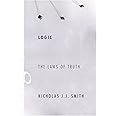
Customers who viewed this item also viewed
Product description
Review
"[T]his volume displays a masterly combination of clarity, friendliness to the beginning student with technical accuracy, and carefully thought out choice of topics that is hard to find on the market. Smith succeeds in introducing his readers to the complexities of symbolic logic in a very gentle manner--there is not a formula or a definition in the book that is not thoroughly explained or illustrated with an abundance of examples."---F. Paoli, History and Philosophy of Logic
"An excellent textbook for an undergraduate course on this topic."---Peter W. Evans, Philosophy in Review
"This book provides an excellent comprehensive introduction to classical first-order logic with identity. It has the expected virtues of clarity, precision and accessibility. . . . The book deserves to be used widely, both as a text for courses and for self-study."---Greg O'Hair, Australasian Journal of Philosophy
"You will find this book outstanding whenever you read it, but you'll be even smarter if you read it before other, even excellent, logic books in your library."---George Hacken, Computing Reviews
From the Back Cover
"Smith's book combines accessibility with comprehensiveness in a way that I have not found in other texts. It is very readable and well paced, but does not sacrifice precision. Difficult issues aren't glossed over or skipped, but are introduced at a gentle pace for novice logicians. As a teacher of logic, I see real benefits in Smith's approach."--Jennifer Duke-Yonge, Macquarie University, Australia
"Lots of books aim to provide a first introduction to symbolic logic. I predict that this one will be widely adopted throughout the English-speaking world. One of its unique strengths is that it broaches important philosophical issues that naturally arise in connection with symbolic logic. The book thus serves both as an introduction to logic itself and to the philosophy of logic."--Stewart Shapiro, editor of The Oxford Handbook of Philosophy of Mathematics and Logic
About the Author
Nicholas J. J. Smith is senior lecturer in philosophy at the University of Sydney in Australia. He is the author of Vagueness and Degrees of Truth.
Product details
- Publisher : Princeton University Press
- Publication date : 12 June 2012
- Language : English
- Print length : 544 pages
- ISBN-10 : 0691151636
- ISBN-13 : 978-0691151632
- Item weight : 1.05 kg
- Dimensions : 16 x 4.83 x 23.62 cm
- Best Sellers Rank: 111,126 in Books (See Top 100 in Books)
- 22 in Logic Textbooks
- 46 in Logic (Books)
- Customer Reviews:
About the author

Discover more of the author’s books, see similar authors, read book recommendations and more.
Customer reviews
Top reviews from Australia
There was a problem filtering reviews. Please reload the page.
- Reviewed in Australia on 21 June 2023Format: HardcoverVerified PurchaseThe package arrived at unhygienic state with lots of ANTS inside the cover.
 The package arrived at unhygienic state with lots of ANTS inside the cover.
The package arrived at unhygienic state with lots of ANTS inside the cover.
Images in this review
- Reviewed in Australia on 9 August 2023Format: HardcoverVerified PurchaseSent me a dirty and damaged copy of an expensive book
 Sent me a dirty and damaged copy of an expensive book
Sent me a dirty and damaged copy of an expensive book
Images in this review
Top reviews from other countries
 BuddlezumpReviewed in the United States on 7 September 2012
BuddlezumpReviewed in the United States on 7 September 20125.0 out of 5 stars An excellent and well balanced introductory text
Format: KindleVerified PurchaseI tutor undergraduate students from this text at a leading Australian university. The text is well organised and the key introductory concepts such as truth preservation, validity, and soundness are presented in order and manner that promotes a high degree of comprehension for beginners. There are also plenty of appropriate exercises, and explanations provided refer to selected exercises and examples in a way highly conducive to improving the student's understanding. Smith's treatment of propositions provides a conceptual placeholder for students that prevents confusion, while accommodating development of the concept.
The terms and vocabulary of the text have an understated but consistent informational tone and informational concepts are put to good use without being distracting or obstructive. They are introduced in order to promote understanding of propositions and semantic content. The concept of referring terms and semantic content is presented using the idea of the conveyance of information about a state of affairs. This demonstrates that the scholarly underpinnings of the text are informed by the latest developments in the philosophy of information and associated developments in logic (See Luciano Floridi's analysis of 'the information that' in relation to his IL or information(al) logic: The Philosophy of Information). This approach is also conducive to handling the concepts associated with propositions and truth.
PL and truth tables are presented before trees, and then predicate logic is introduced in a helpful stepwise manner. Explanations of quantifiers, variables and scope is clear, comprehensive, and effective. Chapter 6 provides an in depth and yet accessible explanation of the differences between natural languages and PL, and helps clarify the project and theme of the entire book (the laws of truth) which is established in the earlier chapters. The progression through monadic to general predicate logic in part II is well executed with a solid step by step development and consolidation of key concepts, and again the theme of the book is reinforced.
The syntactic/semantic distinction is treated well throughout and the notation is presented systematically in a helpful manner in step with the explanatory content.
I found the text excellent for my own revision, and would recommend it for that purpose and for the purpose of tutoring undergraduate students.
P.S. Like most Kindle editions, this one would benefit from a mapping of page numbers to location numbers in the text, but the sections and exercises are all labelled amply with section and subsection numbers and so it is not difficult to search for the material students are interested in referring to from their hardcopy texts.
-
 Juan ValverdeReviewed in Spain on 2 November 2014
Juan ValverdeReviewed in Spain on 2 November 20145.0 out of 5 stars MUY BUEN LIBRO
Format: KindleVerified PurchaseClaro, conciso, nada aburrido. Es la obra de alguien que sabe mucho de lógica y lo sabe contar muy bien.
 BolanoReviewed in the United States on 10 November 2013
BolanoReviewed in the United States on 10 November 20135.0 out of 5 stars Great Self-Study Text
Format: KindleVerified PurchaseThe way I am completing my degree I did not have a chance to do a formal logic course (only an informal / critical thinking unit). I am using this book to fill the gap, and have to say for self-study it would be hard to go past this book. It goes beyond the basic mechanics to cover deeper philosophical issues like implicature and so on, and goes over the subjects of completeness and the like. It also includes trees, truth tables and a bit of natural deduction and other methods. I think for anyone self-studying with only one book to take them from a beginning level to a fairly good understanding to prepare for intermediate / advanced texts, this is about as good as it gets. I didn't start as an absolute beginner so I can't say how easy it is to start from scratch with this text but I'd say most would find it clear. Substitute with some others if you need more examples, but this has been great for my purposes.









